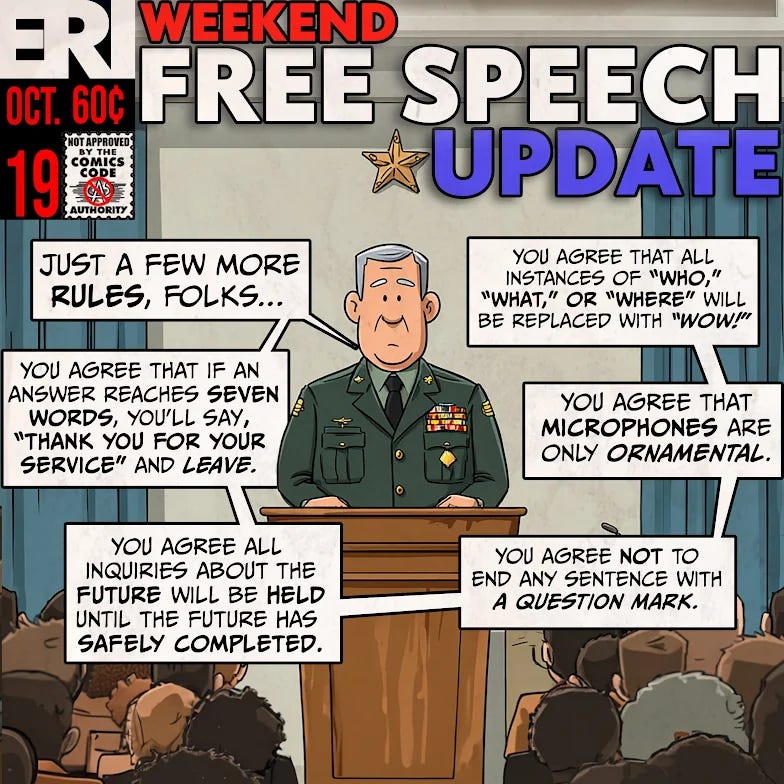The trouble with ‘dignity,’ Texas campuses have free speech after dark again, journalists unite to reject pentagon press pool plan, & more!
Bringing you the latest free speech news (10/19/25)
Stories of the week
“Dignity” can mean many things: (a) the inherent value of the human person; (b) the social honor one commands in the eyes of others; (c) the inner self-respect that resists humiliation; or all the above. These meanings both overlap and collide. Which, then, is a university to enforce: the idea of respect, the appearance of respect, or the feeling of respect?
There is no objective way to make this decision. And when a rule depends on subjective perception, it cannot be applied fairly. What one dean calls satire, another may label cruelty. What one student finds invigorating, another experiences as demeaning. And all of these people may be completely in earnest. Under such conditions, enforcement becomes a matter not of principle but of preference.
“Texas’ law is so overbroad that any public university student chatting in the dorms past 10 p.m. would have been in violation,” said FIRE Senior Attorney Adam Steinbaugh. “We’re thankful that the court stepped in and halted a speech ban that inevitably would’ve been weaponized to censor speech that administrators disagreed with.”
This week in ERI
This week in Expression
Finally, as we’ve previously noted, attempts to sanction scholars have reached record highs, underscoring growing tension between higher education and political forces. What’s particularly striking is that many of these efforts are being spearheaded by government actors, both at the state and federal levels. Legislators and public officials are increasingly targeting faculty members for speech they deem controversial or politically charged, often under the guise of combating bias.
This week on So to Speak
This week, Nico Perrino was joined by his colleague, FIRE Senior Scholar of Global Expression Sarah McLaughlin to discuss her new book, Authoritarians in the Academy.
This week in FIRE’s blog
Act now: Condemn IU’s censorship of student media by William Harris
FIRE in the press!
UR won’t explain why an Eastman student was expelled (Rochester Beacon) by Jessie Appleby & William Harris
London Calling: Ronnie’s First Amendment Roundup
Federal court enjoins new Texas law restricting campus speech because, “The First Amendment does not have a bedtime of 10:00 p.m.”
(with thanks to guest author JT Morris)
A federal district court has granted a preliminary injunction against Texas’s “Campus Protection Act” that imposes sweeping bans across the University of Texas System on a host of First Amendment activity, including–but not limited to–a ban on nearly all protected speech between 10 p.m. and 8 a.m. A diverse group of Texas university students and a pro-freedom advocacy group sued to stop the Act from silencing protected expression. In granting their motion for a preliminary injunction, the court held they have standing to bring a pre-enforcement challenge against the Act and the university policies that implement its bans on expression, because the “threat of future enforcement is substantial.” Next, it held that because the Act’s bans require students to “first determine if their activity or speech is commercial or non-commercial,” it is a content-based restriction on speech requiring the government to overcome strict scrutiny. The court then had little trouble holding the government is unlikely to show the Act’s sweeping bans on protected speech at public universities are “the least restrictive means of achieving a conducive and safe learning environment.” For instance, it pointed out how the ban on speech between 10 p.m. and 8 a.m. prohibits non-commercial speech even if non-disruptive, but permitted commercial speech, “even if such speech is disruptive.” “The First Amendment does not have a bedtime of 10:00 p.m.,” the district court recognized. It likewise recognized that banning invited speakers, amplified sound, or drumming during the last two weeks of any academic term failed to meet strict scrutiny, because those bans are not limited to only disruptive activities. For the same reasons, the Court held the Act’s sweeping bans likely violate the First Amendment on their face for being overly broad. FIRE represented the plaintiffs in their suit.
International free speech stories of the week
Man fined for burning Qur’an in London wins appeal against conviction (The Guardian) by Matthew Weaver
Mr Justice Bennathan said that while burning a Qur’an might be something “many Muslims find desperately upsetting and offensive”, the right to freedom of expression “must include the right to express views that offend, shock or disturb”.
Student arrested after chanting about putting Zionists ‘in the ground’ (BBC)
Yemen: Human Rights Lawyer Arrested (Human Rights Watch)
Video of the week
The Trump administration’s attempted deportations of Mahmoud Khalil, Rümeysa Öztürk, and others in the United States with green cards or student visas has raised the question, “what First Amendment rights do non-citizens in the United States have?” The first episode in FIRE’s new series, “1AX” — as well as FIRE’s lawsuit against Secretary of State Marco Rubio — set out to answer that question once and for all.





The Mahmoud Khalil case really should not be as controversial as it is.
US immigration law plainly states in black and white that supporting terrorism, or associating with groups that support terrorism, renders you inadmissible into the United States.
Khalil, while in the United States, has acted in support of an organization that virtually everyone in the world agrees is a terrorist organization. Freedom of speech is not a suicide pact, it doesn't mean we need to welcome people into this country who want us dead.
US immigration law also defines assassination as a terrorist act, so the deportations of people who celebrated Charlie Kirk's killing are also consistent with the law. Again, freedom of speech doesn't mean we need to welcome people into this country who want us dead.
These are not freedom of speech issues, they are simple national security issues.
Your video maker doesn't seem to realize how discrediting his interviewing David French, and treating him as an authority, is for most Trump supporters. Even more discrediting is the refusal to acknowledge the other Free Speech problem which many expressions of support for Hamas entail, in that not a few of these expressions call, explicitly or implicitly, for violence against Jews. I don't know if Khalil went there, but he is supporting Hamas, right? That is not so far from supporting the Nazi party, or supporting Stalin's communism, is it?
Morally, I have little issue w/ what Rubio did, though I could be convinced that he isn't being careful enough by latching onto a law's language that could be abused by others. The specifically constitutional issue, which (I guess) turns on the "person" issue, could go either way from me, but that's precisely what the video doesn't address, or try to convince me about. The video just wants me to adopt the same attitude on the Trump admin on free speech as French has, which, news-flash, ain't ever gonna happen.
Rethink your persuasion strategies.